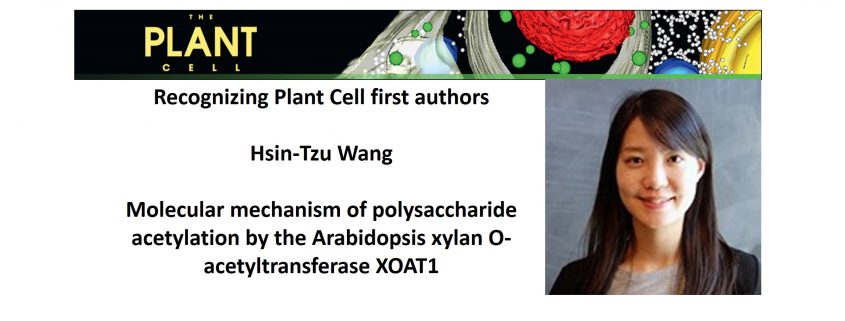Recognizing Plant Cell authors: Hsin-Tzu Wang
Hsin-Tzu Wang, co-first author of Molecular mechanism of polysaccharide acetylation by the Arabidopsis xylan O-acetyltransferase XOAT1
Current Position: Ph.D. candidate in the Department of Biochemistry and Molecular Biology at the University of Georgia
Education: B.S. and M.S. in Forestry and Resource Conservation at National Taiwan University
Non-scientific Interests: playing volleyball and ukulele
Brief bio: I obtained my B.S. and M.S. in Forestry based on the study of the synthesis of mannan polysaccharides that built up the cell walls in the model plant poplar, and it was the beginning of my research life related to plant cell wall synthesis. The project was about over-expressing the mannan synthesis gene in Populus trichocarpa, following by the analysis of the transgenic plants in different aspects. It was an interesting project, but the important mechanism used by the enzyme to constitute the polysaccharide was not deciphered. Thereafter, I decided to dedicate my efforts to further researches of characterizing enzymes involved in plant cell wall synthesis and investigating how they work. I joined Complex Carbohydrate Research Center at the University of Georgia and started my research of the synthesis of another important cell wall polysaccharide, xylan. So far, I’ve been amazed by the fascinating structure of the enzyme involved in acetylating xylan backbones in Arabidopsis, and was intrigued by the highly conserved mechanism that is shared by multiple enzymes in nature. The details of the study are described in the highlighted paper. The process of plant cell wall synthesis is fine-tuned, and even subtle changes of the cell wall structure could be critical to plant growth. Understanding the formation of cell walls can not only gain our knowledge of one of the most delicate constructions in nature, but could also improve our utilization of biomass-based materials in human society.




